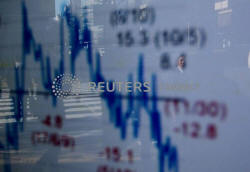Stocks whacked as China export decline highlights trade
war damage
 Send a link to a friend
Send a link to a friend
 [December 09, 2019] By
Tommy Wilkes [December 09, 2019] By
Tommy Wilkes
LONDON (Reuters) - Global equity markets
were in a somber mood on Monday, holding well off recent two-year highs
after Chinese export data highlighted the damage from the 17-month long
trade war and re-focused attention on a crucial Dec. 15 tariff deadline.
Markets had closed last week in an upbeat mood as forecast-beating U.S.
jobs data reassured investors about the U.S. economy and sent MSCI's
index of global stocks 0.8% higher <.MIWD00000PUS> but those gains
stalled as worries about a Chinese economic slowdown returned.
Wall Street, which closed just 1% off record highs on Friday, was set
for a slightly weaker open, futures showed.
Several big events loom for the week -- the Federal Reserve meets on
Wednesday and new European Central Bank chief Christine Lagarde holds
her first policy meeting on Thursday, the same day as Britain's
parliamentary election.
But at the forefront of investors' minds is the Dec. 15 deadline for the
United States to impose a new round of tariffs on China.
Top White House economic adviser Larry Kudlow said on Friday that the
deadline was still in place but he also said President Donald Trump
likes where trade talks with China are going.

"If we see Donald Trump decide not to delay tariffs, that would lead to
a risk-off reaction in markets," said Nomura currency strategist Jordan
Rochester.
"We don't expect tariffs to go into effect as the talks are ongoing but
the trade talks are the main driver this week," he said, adding he did
not expect any "fireworks" from the central bank meetings.
A pan-European equity index <.STOXX> inched down 0.1%, having jumped 1%
on Friday, as did the German DAX <.GDAXI>. France's CAC 40 <.FCHI> --
hit last week by fears of U.S. tariffs on its luxury exports such as
wine and handbags -- shed 0.3 percent.
Europe's energy sector was the biggest loser of the day, falling almost
1% as shares in Tullow Oil slumped 60% to 19-year lows <TLW.L> due to
issues at its main producing assets in Ghana and the resignation of its
chief executive.
Asia, however, managed to notch up small gains, with Japan's Nikkei
<.N225> adding 0.33 percent and MSCI's Asia-Pacific shares outside Japan
<.MIAPJ0000PUS> up 0.15 percent.
Futures for the U.S. S&P500, Dow Jones and Nasdaq indexes were all down
a marginal 0.1% <ESc1> <YMc1> <NQc1>
[to top of second column] |

A man is reflected on an electronic board showing a graph analyzing
recent change of Nikkei stock index outside a brokerage in Tokyo,
Japan, January 7, 2019. REUTERS/Kim Kyung-Hoon

CHINESE SHIVERS
Markets have been largely working on the assumption that the Dec. 15 tariffs,
covering consumer goods such as cellphones and toys, will be dropped or
postponed, given Trump will be unwilling to risk a year-end equity selloff.
Concerns about damage being done to the global economy by the trade war, were
renewed after China released data showing its exports shrank for the fourth
consecutive month in November.
Chinese shares closed 0.2% lower, their losses checked by a rise in imports that
was interpreted as a sign that Beijing's stimulus steps are helping to stoke
demand.
The U.S. dollar, which bounced on Friday after data showed U.S. job growth
increased in November by the most in 10 months, was down marginally against a
basket of currencies <.DXY> and the euro, at $1.107 <EUR=EBS>.
The strong labor market data in the United States allayed fears about a slowdown
in the world's largest economy which had been fanned by a series of weak figures
on business and consumer activity.
"The clouds of recession still remain well offshore despite troubled economies
elsewhere in the world and a trade war," said Chris Rupkey, chief financial
economist at MUFG Union Bank.
The biggest currency mover was the British pound which rose to a new 7-month
high of $1.3180 <GBP=D3> as investors raised their bets on a Conservative Party
victory - and a majority in parliament - in the general election.
Yields on government bonds inched lower, in keeping with market jitters as
investors awaited the central bank meetings. U.S. 10-year Treasury yields were
down 2 basis points at 1.8242%
Oil prices weakened after the disappointing Chinese trade data, with Brent
futures <LCOc1> down more than 1% at $63.73 per barrel after gaining about 3
percent last week on the news that OPEC and its allies would deepen output cuts.
(Additional reporting by Dhara Ranasigne and Sujata Rao in London, Tomo Uetake
in Sydney and Hideyuki Sano in Tokyo,; Editing by Gareth Jones and Ed Osmond)
[© 2019 Thomson Reuters. All rights
reserved.] Copyright 2019 Reuters. All rights reserved. This material may not be published,
broadcast, rewritten or redistributed.
Thompson Reuters is solely responsible for this content. |